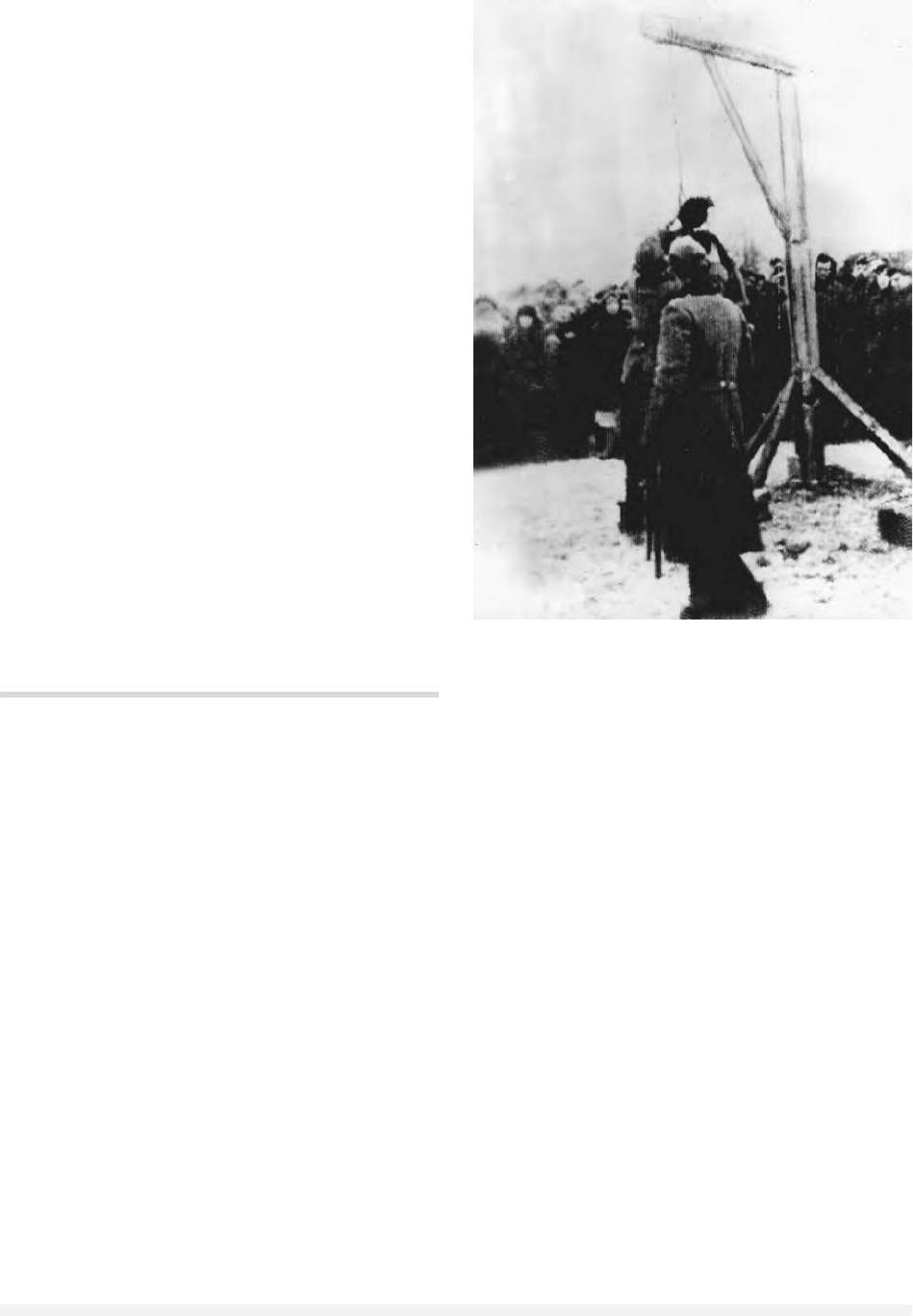Encyclopedia of Russian History
Подождите немного. Документ загружается.


lowed to help themselves to whatever they felt that
their fiefdoms could offer.
See also: ECONOMY, TSARIST
BIBLIOGRAPHY
Pipes, Richard. (1974). Russia Under the Old Regime. New
York: Charles Scribner’s Sons.
S
TEFAN
H
EDLUND
KORMOVYE KNIGI See FEAST BOOKS.
KORNAI, JANOS
(b. 1928), economist.
Janos Kornai was educated in Budapest and be-
came professor of economics in the Institute of Eco-
nomics of the Hungarian Academy of Sciences in
1967 and at Harvard University in 1986.
In Overcentralization in Economic Administration
(1957) Kornai was one of the first in the Soviet bloc
to show the defects of central planning and argue
for more decentralization and use of financial and
market methods in guiding the socialist economy.
His Mathematical Planning of Structural Decisions
(1967; second edition 1975) developed the idea of
two-level planning.
Kornai attempted to apply organizational and
information theory, as well as management sci-
ence, to analyze the advanced socialist economy in
his Anti-Equilibrium (1971). He employed non-
equilibrium concepts to replace the Walrasian mar-
ket-clearing of standard neoclassical theory. Along
these lines, his Economics of Shortage (2 vols., 1980)
pictured an economy, like Hungary’s or Soviet Rus-
sia’s, with chronic excess demand and limited price
flexibility. Supply would be allocated to meet ex-
cess demand by nonprice, quantitative methods.
Tautness would show up as queues for consumer
goods, indicating inefficiency and underutilization
of resources.
During this period, Kornai developed his fa-
mous concept of the “soft budget constraint.” So-
cialized enterprises were not required to cover costs,
as ad hoc subsidies and credits would invariably be
made available by state institutions so that the firm
would not have to close. Loss-making enterprises
were a cause of excess demand in the economy.
Following the democratic revolution in Hun-
gary, Kornai argued for fiscal restraint, particularly
in the payment of pensions, so that Hungary could
invest more for growth.
See also: ECONOMIC GROWTH, SOVIET
M
ARTIN
C. S
PECHLER
KORNILOV AFFAIR
The Kornilov Affair was the main counterrevolu-
tionary episode of the Russian Revolution of Feb-
ruary 1917. It grew out the general political and
socioeconomic crises of the summer, including the
failure of the military offensive, government in-
stability, economic disintegration, and, in particu-
lar, the emergence in July and August of a more
assertive political right demanding a “restoration of
order.” Attention increasingly centered on General
Lavr Kornilov, who emerged as the potential
Napoleon of the Russian Revolution.
After the summer 1917 offensive failed, Ko-
rnilov vigorously advocated using harsh measures
to restore discipline in the army. This drew the at-
tention of a wide range of people interested in
restoration of order, mostly conservatives and lib-
erals but also some socialists, who found him more
acceptable than most generals (he had a reputa-
tion for being more “democratic” because of his
modest background and good relations with his
troops). They pressured Alexander Kerensky, now
head of government, to appoint Kornilov supreme
commander-in-chief of the army, which Kerensky
did on July 31. The problems that lay ahead were
signaled by Kornilov’s remarkable acceptance con-
ditions, especially that he would be “responsible
only to [his] own conscience and to the whole peo-
ple,” and his insistence on a free hand to restore
military discipline. Kerensky did not really trust
Kornilov, but hoped to use him both to appease the
right and to counterbalance the left. Kornilov in
turn disdained the Petrograd politicians. Intermedi-
aries, especially Boris Savinkov, a former Socialist
Revolutionary terrorist who was now the assistant
minister of war, tried to convince Kerensky and Ko-
rnilov that the salvation of the country rested on
their cooperation.
During August, tensions surrounding Kor-
nilov’s presumed intentions grew. Leftist newspa-
pers and orators warned that he was a potential
KORNILOV AFFAIR
773
ENCYCLOPEDIA OF RUSSIAN HISTORY

counterrevolutionary military dictator, while con-
servative newspapers and speakers hailed him as
the prospective savior of Russia. People looking to
break the power of the soviets and change the po-
litical structure began to organize around him. The
degree of his knowledge and approval of these ef-
forts remains unclear, but he clearly saw himself as
a key figure in the regeneration of Russia and the
reconstruction of Russian politics, perhaps by force.
By September political tensions in Petrograd
were high. Kerensky and Kornilov groped toward
some sort of agreement, despite mutual distrust.
An exchange of messages, mostly through inter-
mediaries (Kornilov was at military front head-
quarters), explored restructuring the government
and discussed the respective roles of the two
men. These also revealed their suspicions of each
other. Kerensky became convinced that the general
planned a coup and, on September 9, he suddenly
dismissed Kornilov. Outraged, Kornilov denounced
Kerensky and launched army units toward Petro-
grad. This quickly collapsed as delegates from the
Petrograd Soviet convinced the soldiers that they
were being used for counterrevolution. By Sep-
tember 12 the Kornilov revolt had foundered, and
Kornilov and some other generals were arrested.
The Kornilov Affair had enormous repercus-
sions. Kerensky, the moderate socialists, and the
liberals were discredited because of their earlier sup-
port of Kornilov. The Bolsheviks and radical left, in
contrast, had warned against the danger of a mil-
itary coup and now seemed vindicated. Their po-
litical stock soared, and they soon took over the
Petrograd and other soviets, preparing the way for
the October Revolution.
See also: FEBRUARY REVOLUTION; KERENSKY, ALEXANDER
FYODOROVICH; OCTOBER REVOLUTION; PROVISIONAL
GOVERNMENT
BIBLIOGRAPHY
Ascher, Abraham. (1953). “The Kornilov Affair.” Russ-
ian Review 12:235–352.
Asher, Harvey. (1970). “The Kornilov Affair: A History
and Interpretation.” Russian Review 29:286–300.
Munck, J. L. (1987). The Kornilov Revolt: A Critical Ex-
amination of the Sources and Research. Aarhus, Den-
mark: Aarhus University Press.
White, James D. (1968–1969). “The Kornilov Affair: A
Study in Counter Revolution.” Soviet Studies 20:
187–205.
R
EX
A. W
ADE
KOROLENKO, VLADIMIR
GALAKTIONOVICH
(1853–1921), noted Russian short-story writer,
publicist, and political activist.
When Korolenko was arrested in 1879 for alleged
populist activities and exiled to Siberia, he used the
time to write many lyrical tales, exceptional for
their descriptions of human sadness and desolate
nature. His existential sufferings in Yakutsk, dur-
ing which he often contemplated suicide, find ex-
pression in his writings.
One of Korolenko’s famous short stories,
“Makar’s Dream” (1885), is also set in Siberia. In
it, Makar, a poor little peasant who has become
half-savage by his association with the Yakutsk
people, dreams of a better future. Normally he has
no time for dreaming; his days are consumed by
hard physical labor—chopping, ploughing, sowing,
and grinding. He only dreams when he is drunk.
One Christmas Eve, Makar drifts off in a drunken
sleep and dreams that the god of the woods, Tayon,
has judged him harshly for his former deeds and
has decided to transform him into a post-horse.
Makar ends up convincing Tayon of his innate
goodness.
In another famous story, “The Blind Musician”
(1886), a blind youth overcomes his painful self-pity
to become a sensitive violinist whose music takes on
universal resonance. As his uncle watches the cap-
tivated audience, he thinks about his nephew. “He
understands suffering. He has had his share, and
that is why he can change it into music for this
happy audience.” Korolenko’s talent thus lies in his
expressions of the emotional and sentimental di-
mensions of life, his compassion for the downtrod-
den, as well as his masterful depictions of nature,
which have much in common with Turgenev’s.
Like many Russian writers, Korolenko felt that
literature should play a leading role in advancing
human progress; that a writer should not stand
idly by in the face of injustice. He sought to create
works that would unite realism and romanticism.
In one historical story about the revolt of the Jews
against the Romans (“A Tale about Florus, Agrippa,
and Menachem, the Son of Jehudah”), Korolenko
rebuts Tolstoy’s doctrine of nonviolent resistance
to evil. In works such as “The Day of Atonement”
(first entitled “Iom-Kipur,” 1890) and later in
“House Number 13,” Korolenko also took issue
with anti-Semitism. Korolenko condemned the Bol-
shevik regime and the Red Terror he witnessed in
KOROLENKO, VLADIMIR GALAKTIONOVICH
774
ENCYCLOPEDIA OF RUSSIAN HISTORY

indignant letters that he wrote to Anatoly Lu-
nacharsky, the People’s Commissar for Education.
See also: INTELLIGENTSIA; SIBERIA
BIBLIOGRAPHY
Korolenko, Vladimir Galaktionovich. (1972). The History
of My Contemporary. New York: Oxford University
Press.
Korolenko, Vladimir Galaktionovich. (1971). Makar’s
Dream, and Other Stories. Freeport, NY: Books for Li-
braries Press.
Korolenko, Vladimir Galaktionovich, and Antony
Lambton. (1986). Bad Company and Other Stories.
London: Quartet.
J
OHANNA
G
RANVILLE
KORSH THEATER
Founded in 1882 by entrepreneur F. A. Korsh
(1852–1923), this was the first successful private,
commercial theater established after the repeal of
the government’s monopoly on theaters in the two
capitals, Moscow and St. Petersburg. Built in the
heart of Moscow’s bustling theater district, the Ko-
rsh Theater was designed to meet four professional
objectives: to respond to audiences’ changing aes-
thetic demands; to increase performance opportu-
nities for provincial actors; to present productions
of new plays, which led to special Friday night per-
formances of experimental works; and to make
both the Russian and the international dramaturgy
available to students, which Korsh accomplished by
offering free Sunday morning performances. The
playwrights whose works played in Russia first at
the Korsh included Hermann Sudermann, Edmond
Rostand, Henrik Ibsen, August Strindberg, George
Bernard Shaw, and, perhaps most significantly,
Anton Chekhov. Performers who advanced their
careers here included comedian Vladimir Davydov,
heartthrob Alexander Lensky, and light opera
celebrities Lidia Yavorskaya and Maria Blyumen-
tal-Tamarina. The theater itself, designed by na-
tionalist architect M. N. Chichagov, was the first
to use electric lighting.
Korsh could afford his artistic innovations be-
cause of the extent to which he catered to the crowd,
exemplifying the “dictatorship of the box office.”
The most popular, and prolific, playwright in his
employ was I. I. Myasnitsky (Baryshev), who kept
Korsh supplied with farces, comedies of topical is-
sues with protagonists from all social backgrounds,
such as “The Old Woman Makes a Fool of Herself.”
The theater’s most famously popular production
was the 1892 staging of Victorien Sardou’s com-
edy about Napoleon’s ex-washer woman, Madame
Sans-Gene, translated by Korsh himself, and featur-
ing the latest fashions directly from Paris.
Until its incorporation by the Soviet govern-
ment in 1925, the Korsh Theater offered a central
locale where new ideas about Russian culture were
contested, reshaped, sometimes vulgarized, but al-
ways celebrated.
See also: CHEKHOV, ANTON PAVLOVICH; THEATER
BIBLIOGRAPHY
McReynolds, Louise.(2003). Russia at Play: Leisure Activ-
ities at the End of the Tsarist Era. Ithaca, NY: Cornell
University Press.
L
OUISE
M
C
R
EYNOLDS
KORYAKS
The Koryaks (Koryaki) are an indigenous Paleo-Asi-
atic people living in northeast Siberia, on the north-
ern part of the Kamchatka Peninsula and on the
adjoining mainland from the Taigonos Peninsula to
the Bering Sea (a total of 152,000 square miles, or
393,680 square kilometers). The traditional roam-
ing area of the nomadic Koryaks has been west of
the Kamchatka Central Range, up to the Itelmen set-
tlements. In addition to Koryaks, Itelmens, Chukchi,
and Evenki have also lived on this territory for
centuries. Administratively the Koryaks live in the
Koryak Autonomous Region (okrug), a territory ap-
proximately the size of Arizona and which is one
of the ten autonomous regions recognized in the
Russian Constitution of 1993.
The Koryak Autonomous Region is just one
part of the larger Kamchatka Peninsula, which in-
cludes the Karaginsky and Komandorsky islands in
the Bering Sea. With an area of about 490,425
square miles, the countries England, Portugal, Bel-
gium, and Luxembourg together could be placed on
the territory of Kamchatka. The peninsula contains
many volcanoes, some of them active. The Koryak
territory is mostly forest tundra, as well as tundra
in the subarctic climate belt. The highest tempera-
ture in the summer is 34° centigrade and the low-
est in the winter (in the central and northern parts
of the peninsula) falls to about –49° centigrade.
KORYAKS
775
ENCYCLOPEDIA OF RUSSIAN HISTORY

The term koryak derives from the word for rein-
deer (kor). When combined with its prepositional
suffix, korak means “with (or at) the reindeer.”
This is not surprising, given the Koryak’s heavy re-
liance on reindeer for a wide range of bare essen-
tials, including meat, transportation, household
articles, fat (to light indoor lamps), materials for
constructing mobile dwellings (yarangas), bones
(for tools and household items), and hides (to make
clothes, footwear, and even diapers and sanitary
napkins). When referring to themselves, however,
the Koryaks do not use the term. Instead, they call
themselves either nimilany (“residents of a settled
village”) or chavchuvens (nomadic reindeer people).
In contrast to some other non-Russian nation-
alities, such as the Tuvinians, the Koryaks are a
minority in their own region. Russians and Ukrain-
ians make up more than 75 percent of the total
population. The remaining 25 percent are Koryaks,
Chukchi, Itelmens, and Evenki. Koryaks make up
only one-fifth of the indigenous Siberian popula-
tion.
See also: EVENKI; NORTHERN PEOPLES; NATIONALITIES
POLICIES, SOVIET; SIBERIA
BIBLIOGRAPHY
Berdahl, Daphne, and Bunzl, Matti. (2000). Altering
States: Ethnographies of Transition in Eastern Europe
and the Former Soviet Union. Ann Arbor: University
of Michigan Press.
Humphrey, Caroline. (2002). The Unmaking of Soviet Life:
Everyday Economies after Socialism. Ithaca, NY: Cor-
nell University Press.
Keay, John. (2002). The Mammoth Book of Explorers. New
York: Carroll & Graf.
Reid, Anna. (2003). The Shaman’s Coat: A Native History
of Siberia. New York: Walker & Company.
Whybrow, Helen. (2003). Dead Reckoning: Great Adven-
ture Writing from the Golden Age of Exploration,
1800–1900. New York: W. W. Norton.
J
OHANNA
G
RANVILLE
KORZHAKOV, ALEXANDER VASILIEVICH
(b. 1950), aide to President Boris Yeltsin.
Alexander Vasilievich Korzhakov was the most
trusted aide of President Boris Yeltsin until Yeltsin
dismissed him in 1996. From 1970 until 1989 he
worked in Administration 9 of the KGB, which pro-
vided personal security for senior Soviet officials.
From 1985 to 1987 he was a bodyguard to Yeltsin,
and remained loyal to him after Yeltsin was polit-
ically disgraced in 1987. For this the KGB dismissed
him in 1989. During Yeltsin’s political resurrection
Korzhakov resumed work as his bodyguard. From
1991 he headed the Presidential Security Service
(PSS) with the rank of major general, and increas-
ingly became a close political adviser to Yeltsin. In
August 1991 he played an important role in
Yeltsin’s successful defeat of the three-day hard-
line coup.
In October 1993, Korzhakov apparently played
a key role in persuading the defense minister to
have the military storm the parliament. Also, he
personally arrested the leaders of the armed oppo-
sition.
Later he turned the PSS into what Yeltsin called
his personal “mini-KGB.” He built up departments
for personal surveillance, political dirty tricks, and
political and economic analysis. He encouraged
Yeltsin to become politically more authoritarian
and less liberal on economic reform, and even ad-
vocated specific policies on oil. As he freely admit-
ted in his revealing memoir about Yeltsin, he played
a major role in recruiting Boris Berezovsky and
other rich businessmen to support Yeltsin finan-
cially and through their media. Thus he helped turn
them into oligarchs with political clout. In 1995 he
even arranged for Berezovsky to control, finan-
cially and otherwise, the newly created television
company, Public Russian Television. It was impor-
tant, he argued, to have a major channel that was
firmly pro-administration and would counter the
widespread criticism of the Kremlin in the existing
media.
In 1996 Yeltsin appointed Korzhakov to one of
the two teams that organized his reelection bid, the
team headed by Oleg Soskovets. But Korzhakov
feared that Yeltsin would lose, and therefore urged
him to find a pretext to postpone the election and
close down the parliament, or Duma. In March,
Yeltsin took his advice, but opposition in the cab-
inet thwarted his plans at the last minute. In May
he named Korzhakov his first adviser. In June,
however, when Korzhakov and his allies clashed
with the second election team in a fierce struggle
for influence over Yeltsin, the latter suddenly opted
for the second team, headed by Anatoly Chubais,
and dismissed Korzhakov.
In February 1997 Korzhakov was elected to the
Duma as an independent from Tula. In 1999 he
KORZHAKOV, ALEXANDER VASILIEVICH
776
ENCYCLOPEDIA OF RUSSIAN HISTORY

was reelected on a Fatherland ticket and served on
the Defense Committee. During the late 1990s he
gave lengthy interviews detailing numerous al-
legedly corrupt activities of Yeltsin, his family,
Chubais, and others, but did not discuss his own
business affairs. He was never sued for libel or slan-
der, apparently because the people he exposed be-
lieved he had evidence for what he said. Of special
significance were his repeated accounts of how
Berezovsky gave Yeltsin three million dollars in
1994, claiming this was a payment of royalties on
Yeltsin’s memoirs, when in fact the book had
earned negligible royalties.
In 2001 Korzhakov was instrumental in launch-
ing the monthly investigative newspaper Stringer.
See also: AUGUST 1991 PUTSCH; OCTOBER 1993 EVENTS;
SOSKOVETS, OLEG NIKOLAYEVICH; STATE SECURITY,
ORGANS OF; YELTSIN, BORIS NIKOLAYEVICH
BIBLIOGRAPHY
Reddaway, Peter, and Glinski, Dmitri. (2001). The
Tragedy of Russia’s Reforms: Market Bolshevism against
Democracy. Washington, DC: U.S. Institute of Peace
Press.
P
ETER
R
EDDAWAY
KOSMODEMYANSKAYA, ZOYA
(1923–1941), partisan girl known as “Tanya” in
World War II and canonized as Russian war hero-
ine; also known as the Soviet Joan of Arc, she was
posthumously awarded the honorary title Hero of
the Soviet Union.
At the outbreak of war in June 1941, Zoya
Kosmodemyanskaya, member of the Moscow Kom-
somol (Communist Youth), volunteered for the
partisan movement. According to the official So-
viet version, in December 1941, while carrying out
a military assignment behind the front line, she
was caught by the Germans, arrested, tortured, and
finally hanged.
The young girl’s tragic end was used as pro-
paganda to arouse hatred for the cruel enemy and
convey the necessity for vengeance. Written for this
purpose, the numerous reports, which emphasized
her courage, steadfastness, and exceptional strength
of resistance, portrayed her as a true Soviet model
and saint who had endured torture and chosen
death over betraying her comrades—a model ex-
ample for sacrificial death in the “Holy War”
against fascism.
She shared the fate of many other daring and
fearless compatriots who were popularized as heroes
and heroines in the same manner. Yet Kosmode-
myanskaya differed in that the public responded
with compassion and affection, even abroad. Her
unusual popularity cannot be explained by her
heroic exploit alone, being that many others were
called heroes for the same or similar behavior in
fighting the enemy. Rather the visual and verbal
depiction of her short life and tragic fate by several
outstanding artists, poets, and filmmakers con-
tributed to the unusually high degree of veneration.
In additon to dozens of publications on her ex-
emplary life, bearing true hagiographic qualities,
including poems (one by Margarita Aliger), songs,
paintings, plays, it was a documentary photograph
published in the newspaper Pravda on the occasion
of her death that drew the public’s attention be-
cause it broke with the traditional Soviet style of
KOSMODEMYANSKAYA, ZOYA
777
ENCYCLOPEDIA OF RUSSIAN HISTORY
Zoya Kosmodemyanskaya hanged by the Nazis. © H
ULTON
A
RCHIVE

visual representation. Most influential, however,
was the film Zoya directed by Lev Arnshtam (1944).
The beauty and the performance of the actress
Galina Vodyanitskaya in the role of Kosmode-
myanskaya left a lasting impression in popular
consciousness that turned the partisan heroine into
a symbol of identity for more than one postwar
generation of young Soviet women imitating her
in dress, hairdo, and manner.
In the post-Soviet debate on the legend and re-
ality of Soviet war heroes, some voices turned her
into a henchman of Stalin’s plan of “scorched
earth,” killed by the villagers, not by the Germans;
others raised questions about her identity. Still,
Kosmodemyanskaya is one of the few members of
the Soviet pantheon of heroes who did not fall vic-
tim to the strong iconoclastic movement of the
1990s. Kosmodemyanskaya’s place in history lies
beyond historical truth; it is founded on her power
as a legend that became part of collective memory.
Her grave can be found in the Moscow
Novodevishche Cemetery, a special museum and a
monument by M. G. Manizer in the village Petr-
ishchevo, the place of her execution, near Moscow.
See also: WORLD WAR II
BIBLIOGRAPHY
Kosmodemyanskaya, Liubov. (1942). My daughter Zoya.
Moscow: Foreign Language Press.
Sartorti, Rosalinde. (1995). “On the Making of Heroes,
Heroines, and Saints.” In Culture and Entertainment
in Wartime Russia, ed. Richard Stites. Bloomington:
Indiana University Press.
R
OSALINDE
S
ARTORTI
KOSYGIN, ALEXEI NIKOLAYEVICH
(1904–1980), Soviet prime minister.
Alexei Kosygin was born into a worker’s fam-
ily in St. Petersburg. After finishing schooling at
the Leningrad Cooperative Technical School in
1924, he moved to Siberia and worked in a series
of positions in the cooperative movement. It was
while in Siberia, in 1927, that he joined the Com-
munist Party. After returning to Leningrad he com-
pleted further studies at the Leningrad Textile
Institute in 1935. Reflecting the opportunities
opened up by the Stalinist terror and the patron-
age of Leningrad party boss Andrei Zhdanov, Kosy-
gin moved rapidly from being a foreman and shop
superintendent in the Zhelyabov factory through
a series of industrial, city, and party posts, until in
1939 he became people’s commissar for the textile
industry. From April 1940 until March 1953 he
was deputy chairman of the Council of People’s
Commissars (from 1946 Council of Ministers), or
deputy prime minister; from June 1943 until
March 1946 he was also prime minister of Russia.
During this period, he likewise held a series of min-
isterial appointments, principally in the light in-
dustry and consumer goods industry areas.
Kosygin had become a full member of the Party’s
Central Committee in 1939, a candidate member of
the Politburo in March 1946, and a full member in
February 1948.
Kosygin’s upward trajectory was halted in con-
nection with the fall of Zhdanov and the Leningrad
Affair. Although one of the intended victims of this
affair, Kosygin survived, but at the Nineteenth
Party Congress in 1952 he was dropped to candi-
date status in the Presidium (as the Politburo was
then called). Following Stalin’s death and the con-
solidation of the position of one of Kosygin’s ene-
mies, Georgy Malenkov, Kosygin was dropped
altogether from the enlarged Presidium in March
1953. At the same time, he was removed as deputy
prime minister. He retained a ministerial position
in the consumer goods/light industry sector and
was restored as deputy prime minister in Decem-
ber 1953. He held this post until December 1956
when he became deputy chair (and from 1959
chair) of the state planning body. With Malenkov’s
fall as part of the Antiparty Group, in June 1957
Kosygin was restored to candidate membership of
the Presidium and in the following month to the
deputy prime ministership. He retained this post,
from May 1960 as first deputy chairman, until Oc-
tober 1964, when he became chairman of the
Council of Ministers, or prime minister. In May
1960 he also became a full member of the Central
Committee Presidium.
The fluctuations in Kosygin’s official positions
in the early to mid-1950s reflect the vicissitudes of
factional politics in the late-Stalin and early post-
Stalin periods. In particular, Kosygin’s fortunes
seem to have been related inversely to those of
Malenkov. Khrushchev’s triumph over the Anti-
party Group consolidated Kosygin’s position near
the apex of Soviet politics, but it was Kosygin’s
turning against Khrushchev that later allowed
Kosygin to attain prime ministership. When the
Soviet leadership tired of Khrushchev, they turned
KOSYGIN, ALEXEI NIKOLAYEVICH
778
ENCYCLOPEDIA OF RUSSIAN HISTORY

to Kosygin and Brezhnev. In the initial post-
Khrushchev period, there seemed to be a general
balance both between these two leaders and within
the broader party leadership. Initially Kosygin was
actively involved in foreign policy, including over-
seeing the Tashkent Agreement between India and
Pakistan in 1965, negotiating with U.S. President
Lyndon B. Johnson at Glassboro in 1967, and con-
ducting key talks with the Chinese in 1965 and
1969. He was the sponsor of the so-called Liber-
man economic reforms (also known as the Kosy-
gin reforms) in September 1965, which sought to
generate greater autonomy from party control for
the economic managers, although he also tightened
central direction of the economy by eliminating the
regional economic councils. Kosygin basically
sought the more efficient management of the econ-
omy, but with the hostile Soviet reaction to the
Prague Spring, the likelihood of liberalizing moves
in the economy was eliminated. The suppression of
the Prague Spring marked the ascendancy of Brezh-
nev and the clear subordination of Kosygn, who
remained prime minister until his retirement in Oc-
tober 1980, and therefore through most of the pe-
riod that Gorbachev would later call the “era of
stagnation”. He was more a technocrat than a
politician, but bears some of the responsibility for
the Soviet Union’s perilous economic situation dur-
ing the 1980s.
See also: BREZHNEV, LEONID ILICH; KOSYGIN REFORMS;
LENINGRAD AFFAIR; MALENKOV, GEORGY MAXIM-
ILYANOVICH; ZHDANOV, ANDREI ALEXANDROVICH
BIBLIOGRAPHY
Breslauer, George W. (1982). Khrushchev and Brezhnev as
Leaders: Building Authority in Soviet Politics. London:
Allen & Unwin.
Gelman, Harry. (1984). The Brezhnev Politburo and the De-
cline of Détente. Ithaca, NY: Cornell University Press.
Tatu, Michel. (1968). Power in the Kremlin: From
Khrushchev to Kosygin. New York: Viking.
G
RAEME
G
ILL
KOSYGIN REFORMS
After Nikita S. Khrushchev was removed in Octo-
ber 1964, Alexei N. Kosygin (1904–1980) became
chairman of the USSR Council of the Ministers, as
part of a duumvirate with Leonid Brezhnev. Within
months the new leadership restored the industrial
ministerial structure, which Khrushchev had re-
placed with regional sovnarkhozy (economic coun-
cils). Gosplan regained its prime role in economic
planning.
In September 1965, Kosygin announced a com-
prehensive planning reform that implemented some
of the ideas of the Kharkov economist Yevsey Liber-
man and many other industrial economists who
had urged relying on the profit indicator instead of
detailed and numerous directives, which often con-
flicted with each other. Profitability had for some
time been one of the indicators of plan fulfillment,
though the main indicator was still gross output
(valovaya produktsia, orval for short), as compared
with planned levels. Now the directives would be
seven in number, with profitability on capital (at
controlled prices, not market ones)—or sales, for
consumer goods firms—to constitute the main
bonus-forming indicator. Instead of four standard
indicators for use of labor, there would be only one:
the wage fund.
Other obligatory tasks were to be sales (real-
izatsiya), assortment, payments to the budget,
centralized investments, new techniques to be in-
troduced, and mandatory supply tasks. The infa-
mous val would be abandoned, along with the cost
reduction target, both of which jeopardized qual-
ity of production. Depending on the enterprise’s
success in increasing sales and the profit rate—and
subject to fulfillment of the other tasks in plan—
retained profits would go to new investments, so-
cial facilities and housing, and extra worker
bonuses. This provision was intended to enhance
material incentives for those engaged at the enter-
prise. Though differentiated and quite complicated,
these norms were supposed to be stable. After pay-
ing a new capital charge of 6 percent, more than
half of net profits usually went to the state, how-
ever, not to enterprise funds. New enterprise whole
prices would be announced by 1967 but still based
on costs, not market scarcity. This would permit
the end to subsidies for loss-making enterprises.
One advantage of the sovnarkhozy system was
retained: The regional inter-industrial supply de-
pots were preserved under the State Committee on
Material Supplies (Gossnsab). Wholesale trade was
thereby to be expanded. Several other state com-
mittees were also established for price setting and
for science and technology. Concern for technolog-
ical change was also reflected in the creation of sci-
ence-production associations, intended to make a
better connection between research, technology,
and the introduction of new goods.
KOSYGIN REFORMS
779
ENCYCLOPEDIA OF RUSSIAN HISTORY

No sooner were these reforms implemented
than significant modifications had to be introduced
to regulate the size and distribution of enterprise
funds. New targets were added for consumer goods
and quality; later in the 1970s, labor productivity,
gross output, and other targets returned to the
mandatory list. Supply problems persisted; little
wholesale trade occurred.
Most specialists believe that the Kosygin re-
forms failed because of continuing imbalances be-
tween feasible supplies and the demands of the
Party-controlled government, the unwillingness to
release prices, and bureaucratic resistance to any
radical change. But tinkering and experiments con-
tinued until 1982. Perestroika would revive many
of the basic ideas of the Kosygin reforms, with a
very different denouement: chaos and collapse
rather than reversal and stagnation.
See also: ECONOMIC GROWTH, SOVIET; KOSYGIN, ALEXEI
NIKOLAYEVICH; LIBERMAN, YEVSEI GRIGOREVICH; PER-
ESTROIKA; SOVNARKHOZY
BIBLIOGRAPHY
Gregory, Paul R., and Stuart, Robert C. (1998). Russian
and Soviet Economic Performance and Structure, 6th ed.
Reading, MA: Addison-Wesley.
Nove, Alec. (1986). The Soviet Economic System, 3rd ed.
Boston: Allen & Unwin.
M
ARTIN
C. S
PECHLER
KOTOSHIKHIN, GRIGORY KARPOVICH
(c. 1630–1667), Muscovite official, émigré, and au-
thor.
As an under-secretary of the Muscovite
Chancery for Foreign Affairs, Grigory Kotoshikhin
was one of the few seventeenth-century Russians
allowed to travel to the West, on diplomatic mis-
sions to Poland and Sweden. In 1663 he began to
give information on foreign policy to the Swedish
agent in Moscow. The following year he fled
abroad, finally settling in Stockholm. At the behest
of the Swedish government he compiled a lengthy
description of the Muscovite state. Fatally injuring
his landlord in a drunken quarrel, Kotoshikhin was
sentenced to death. On the eve of his execution he
embraced the Lutheran faith.
Kotoshikhin’s manuscript was soon translated
into Swedish but then forgotten. Rediscovered in
the late 1830s, it was published in Russia in 1840
under the title On Russia in the Reign of Alexis
Mikhailovich. Though its importance as a histori-
cal source was immediately recognized, the evalu-
ation of Kotoshikhin’s account in Russia and the
Soviet Union would long be influenced by ideolog-
ical considerations. In the nineteenth century,
Westernizers praised Kotoshikhin for exposing
Muscovite backwardness, while Slavophiles con-
demned him for blackening Muscovite reality. In
the late Stalin period and beyond, the dictates of
hyper-nationalism obligated scholars to excoriate
Kotoshikhin as a traitor who defamed his country
to please his Swedish hosts.
There are indeed a few passages in which Ko-
toshikhin lashes out at Muscovite ignorance, dis-
honesty, superstition, and xenophobia and lauds
the “blessed freedom” of the West. But these pas-
sionate outbursts, almost certainly interpolations
in the original text, are in striking contrast with
the content and tone of the rest of the account,
which is severely factual and almost entirely free
of broad generalizations and value judgments. The
level of accuracy is remarkably high, particularly
for someone writing in a foreign country with no
sources other than the Law Code of 1649. Koto-
shikhin emphasized those topics that were of
interest to the Swedish government; these corre-
sponded well with what he knew best. There are
lengthy descriptions of the central administrative
institutions, diplomatic protocol, and court cere-
monial; somewhat shorter discussions of the
nobility, the army, provincial administration, mer-
chants and trade, and the marriage customs of the
upper class; and virtually nothing on the peasantry
or the Orthodox Church. Kotoshikhin portrays a
government of legal norms and bureaucratic
process, and provides strong though not unim-
peachable evidence on the constitutional role of the
estates of the realm in electing or confirming each
tsar from 1584 to 1645.
On Russia in the Reign of Alexis Mikhailovich has
been republished a number of times (1859, 1884,
1906, 1984, and twice in 2000; Pennington, 1980,
is the definitive edition of the text, with exhaustive
linguistic commentaries). It remains a uniquely
valuable source. No other Muscovite ever wrote
anything comparable, and no Western traveler ever
had Kotoshikhin’s expert knowledge.
Kotoshikhin was born ahead of his time. From
the reign of Peter the Great onward, Russians were
able to adopt Western ways and values while re-
KOTOSHIKHIN, GRIGORY KARPOVICH
780
ENCYCLOPEDIA OF RUSSIAN HISTORY

maining loyal to their native land. In Kotoshikhin’s
generation this was not yet possible.
See also: ALEXEI MIKHAILOVICH; LAW CODE OF 1649;
SLAVOPHILES; WESTERNIZERS
BIBLIOGRAPHY
Weickhardt, George. (1990). “Kotoshikhin: An Evalua-
tion and Interpretation.” Russian History 17:
127–154.
B
ENJAMIN
U
ROFF
KOVALEV, SERGEI ADAMOVICH
(b. 1930), dissident, politician, human rights ac-
tivist.
Sergei Kovalev became famous as a dissident in
the 1970s and later as a politician working for hu-
man rights in post-communist Russia. Trained as
a biologist, he spent much of his early career at
Moscow State University. In 1969 he was dis-
missed for dissident activity. From 1970 to 1974
he worked in a research station.
In 1967 Kovalev became involved in human
rights circles, and soon developed a close friendship
with fellow dissident Andrei Sakharov. Like
Sakharov, he believed in the strategy of insisting
on strict application by the authorities of the ex-
isting laws, and also of working for law reform.
In 1968 he was one of the anonymous founders
and editors of the samizdat (typewritten self-pub-
lished) journal A Chronicle of Current Events, which
documented violations of human rights and circu-
lated covertly from hand to hand. In 1969 he was
a founding member of the Action Group to Defend
Civil Rights in the USSR.
In 1974 he was arrested and eventually tried
in closed court. Sentenced to seven years in a strict-
regime labor camp, he served his whole term, tak-
ing part in numerous protests and hunger strikes
by prisoners. On his release he was forced to live
from 1984 to 1987 in the remote town of Kalinin.
In the late 1980s Kovalev took part in various
initiatives aimed at creating a civil society. In 1990
he was elected on a Democratic Russia ticket to the
RSFSR’s Congress of People’s Deputies and its Su-
preme Soviet. He chaired the latter’s Human Rights
Committee, which passed important legislation
on refugees, citizenship, procedures for emergency
rule, the exculpation of political prisoners, and par-
liamentary supervision of the security services.
In the fall of 1993 he opposed Yeltsin’s pro-
roguing of the parliament, but did not support the
parliamentary opposition. In October Yeltsin ap-
pointed him chair of his Commission on Human
Rights, and the political movement Russia’s Choice
elected him chair of its council. In December he was
elected to the new parliament, and as of 2003 has
remained a deputy, switching his allegiance in 2001
from the successor of Russia’s Choice to Yabloko.
In 1996 Kovalev resigned from Yeltsin’s Hu-
man Rights Commission, in protest against his in-
creasing authoritarianism and the war crimes
committed by the military in Chechnya. He con-
tinues to be active in a variety of forums, and is
widely seen in the early twenty-first century as the
leading champion of human rights in Russia.
See also: DISSADENT MOVEMENT; MEMORIAL; SAKHAROV,
ANDREI DMITRIEVICH; SAMIZDAT
P
ETER
R
EDDAWAY
KOVALEVSKAYA, SOFIA VASILIEVNA
(1850–1891), mathematician and writer.
Sofia Korvin-Krukovskaya, growing up on an
estate in Vitebsk province, displayed unusual
mathematical ability from childhood. Desperate to
escape the strictures of gentry womanhood, at
eighteen she contracted a “fictive” marriage with
the paleontologist and social activist Vladimir Ko-
valevsky, who took her to western Europe to study.
In 1874 Kovalevskaya, mentored by the eminent
German mathematician Karl Weierstrass, received
a doctorate from Göttingen University. Afterward,
the Kovalevskys, now married in fact, returned to
St. Petersburg, where their daughter was born in
1878. In 1883 Kovalevsky, embroiled in financial
scandal connected with an oil company scheme,
committed suicide. Unable to find suitable teaching
work in Russia, Kovalevskaya, at the urging of
Weierstrass and the Swedish mathematician Gus-
tav Mittag-Leffler, accepted a professorship in the
newly established Stockholm University, becoming
the first woman in modern Europe to hold such a
post. In Sweden the homesick Kovalevskaya wrote
her vivid reminiscences of girlhood; a novella based
on a true incident, The Nihilist Girl; two plays writ-
ten in Swedish with writer Anna Charlotte Leffler
KOVALEVSKAYA, SOFIA VASILIEVNA
781
ENCYCLOPEDIA OF RUSSIAN HISTORY

under the title Struggle for Happiness, concerning the
contrast between real and ideal fates in life; and
some journalistic articles. In 1888 Kovalevskaya
received the prestigious French Prix Bordin for
mathematics in blind competition. Death from
pneumonia in 1891 cut short Kovalevskaya’s dual
careers as mature scientist and budding author. In
the early twentieth century her story served as in-
spiration for science-minded girls throughout Eu-
rope. Her mathematics—in particular, equations
describing the motions of rotating solids over time
(“Kovalevsky’s top”)—has particular relevance in
the space age.
BIBLIOGRAPHY
Koblitz, Ann Hibner. (1993). A Convergence of Lives: Sofia
Kovalevskaia, Scientist, Writer, Revolutionary. New
Brunswick, NJ: Rutgers University Press.
Kovalevskaya, Sonya. (1979). A Russian Childhood, tr.,
ed., and intro. Beatrice Stillman; with an analysis of
Kovalevskaya’s Mathematics by P. Y. Kochina. New
York: Springer-Verlag.
Kovalevskaya, Sonya. (2001). Nihilist Girl, tr. Natasha
Kolchevska with Mary Zirin. New York: Modern
Language Association of America.
M
ARY
Z
IRIN
KOZLOV, FROL ROMANOVICH
(1908–1965), top Communist party leader during
the 1950s and early 1960s.
Frol Kozlov’s path to power was typical for party
leaders of his generation of Soviet. Born in a village
in Ryazan Province, Kozlov became a worker and as-
sistant foreman at a textile plant where he also served
as Communist Youth League secretary. After study-
ing at the Leningrad Polytechnical Institute and
working as an engineer, he rose through the ranks:
secretary of the Izhevsk city party committee
(1940–1941), second secretary of Kuibyshev
Province (1947–1949), a party leader of Leningrad
(1949–1957), candidate member of the Central Com-
mittee’s Presidium (1957), and a Central Committee
secretary in 1960.
Presidium colleague Alexander Shelepin later
described Kozlov as a “very limited man.” Anastas
Mikoyan labeled him an “unintelligent, pro-Stalinist
reactionary and careerist.” Yet Kozlov backed
Khrushchev in his battle with the Antiparty Group
in 1957, and according to Khrushchev, he seemed
knowledgeable about economic matters, and “firm,
not someone who can be easily swayed.”
By 1963, when Kozlov was de facto second sec-
retary of the Soviet Communist party, he seemed
to Western Kremlinologists to be leading conserv-
ative resistance to Khrushchev’s reforms. In all
probability, however, there was no organized op-
position, and in fact, Kozlov soon began to irritate
Khrushchev, for example, when he allowed the So-
viet Communist Party’s ritual May Day 1963
greetings to other Communist parties to imply an
unauthorized change of line on Yugoslavia. Shortly
after Khrushchev berated Kozlov for this mistake
(but not necessarily because of Khrushchev’s
tirade), Kozlov suffered a stroke, which removed
him from participation in the Presidium, although
he formally remained a member until Khrushchev’s
ouster in October 1964.
See also: KHRUSHCHEV, NIKITA SERGEYEVICH
BIBLIOGRAPHY
Khrushchev, Sergei. (1990). Khrushchev on Khrushchev, tr.
and ed. William Taubman. Boston: Little, Brown.
Tatu, Michel. (1969). Power in the Kremlin: From
Khrushchev to Kosygin, tr. Helen Katel. New York:
Viking Press.
W
ILLIAM
T
AUBMAN
KOZYREV, ANDREI VLADIMIROVICH
(b. 1951), Russian foreign minister.
Andrei Kozyrev served as post-Communist
Russia’s first foreign minister, from 1990 to 1996.
He was well known as an advocate of pro-West-
ern policies, but by the mid-1990s, as these views
fell out of favor, he was forced from office.
Kozyrev was born in Belgium in 1951, where
his father, a Soviet diplomat, was then serving. He
was educated at Moscow State Institute of Inter-
national Relations, and he joined the Soviet Min-
istry of Foreign Affairs, becoming head of the
Department of International Organizations in
1986. He is fluent in English, Spanish, and French.
In 1990, when Russia declared its sovereignty,
Kozyrev was named foreign minister, and he was
one of the leading advocates for reform in Boris
Yeltsin’s circle. After the collapse of the Soviet
Union, he helped spearhead Russia’s pro-Western
KOZLOV, FROL ROMANOVICH
782
ENCYCLOPEDIA OF RUSSIAN HISTORY
